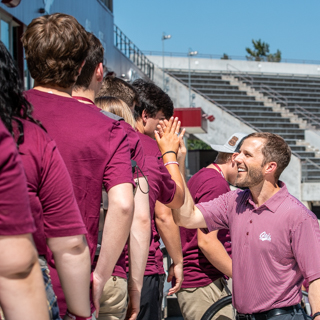Protecting the Health and Safety of Our Community
March 15, 2020
To the members of the UM Family:
Last night, we all learned that Commissioner Christian has tested presumptive positive for COVID-19. Health officials suspect his exposure occurred during the Board of Regents meeting in Dillon on or around March 5. I know this announcement raises many questions for you regarding those UM employees who attended the BoR meeting in Dillon and any subsequent interactions with those individuals.
I have been in close coordination with Dr. Jeff Adams of Curry Health Center and with public health officials, and we would like to share the information below to answer some immediate questions you may be asking. As a campus community, it is important that we minimize the impact of COVID-19 and protect the health and safety of all members of the UM Family and broader Missoula community. Also, as you know, our campus provides essential services, so we must work to keep our campus environment safe and operational, both for our students and for our UM colleagues who come to work here every day.
To do that effectively, we will continue to follow the best practices as established by public health professionals for the safety of every member of our community. While every individual’s situation is unique, to best answer each of our questions as to how we can protect one another and ourselves it is useful to consider four categories of potential risk and outline the appropriate actions for individuals in each of those categories.
1. I have had close personal contact with someone who is a known COVID-19 case.
- Per current guidelines, individuals who have had close personal contact with someone who was symptomatic at time of contact and has tested positive for COVID-19 should self-quarantine for 14 days from the last known exposure with that person. However, individuals who had personal contact with someone who was not symptomatic at the time of contact but then later became symptomatic and tested positive are, per guidelines shared by the Governor's office today, not required to self-quarantine.
- As you may be aware, a number of UM personnel attended the Board of Regents meeting March 4-6 in Dillon, where there was an individual who was not symptomatic during the meeting but has since tested positive. Per the guidelines shared by the Governor’s office, our UM colleagues who were at that meeting would not be considered a contact and would not need to self-quarantine. However, under an abundance of caution, we are asking each of those individuals to self-quarantine until March 20, which is 14 days from last possible exposure. Individuals who exhibit symptoms of COVID-19 during that 14-day window will consult with their medical provider or public health officials and will receive testing as necessary.
2. I have interacted with an individual who had personal exposure to a known COVID-19 infected person, but I myself have not had personal contact with a confirmed case.
- Public health guidelines do not suggest that contact with a non-symptomatic person who had contact with someone with COVID-19 is reason for quarantine. For example, if you have interacted with one of our UM colleagues who attended the Board of Regents meeting in Dillon but who is not symptomatic themselves, quarantine is not necessary or recommended for you.
- If someone with whom you’ve interacted DOES become symptomatic and tests positive, then you fall into Category 1 above.
3. I have symptoms consistent with COVID-19 bu NO known personal exposure to confirmed infection.
- Individuals who are exhibiting symptoms consistent with COVID-19 -- fever of 100.1 or higher, cough, or difficulty breathing – should contact their physician and consider symptomatic treatment or testing on a case-by-case basis. In doing so, please remember that public health guidance is to call your healthcare provider prior to going in person.
4. I have no symptoms of COVID-19 and I have no known personal contact with a confirmed coronavirus positive individual.
- Continue to take all precautions possible to keep yourself and our community safe by following personal hygiene and social distancing guidance. If you have special medical circumstances or underlying health complications in your own medical history or those with whom you interact, please consult with your medical care team. Please know that the University will work with those employees who, under advice from their medical provider, need to make alternative work arrangements.
This situation is evolving daily as we learn more about COVID-19, its transmission risk and management. Public health officials will be updating policies and protocols, and we as a campus will share information as it becomes available.
Thank you for your partnership and teamwork in addressing the situation collaboratively as a community.
Seth
